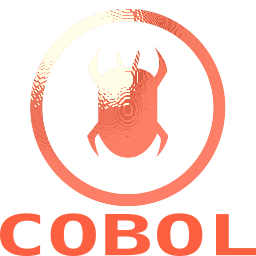https://github.com/OlegKunitsyn/gnucobol-debug
GnuCOBOL debugger
https://github.com/OlegKunitsyn/gnucobol-debug
cobol debugger visual-studio-code
Last synced: 9 months ago
JSON representation
GnuCOBOL debugger
- Host: GitHub
- URL: https://github.com/OlegKunitsyn/gnucobol-debug
- Owner: OlegKunitsyn
- License: gpl-3.0
- Created: 2020-04-19T18:12:12.000Z (over 5 years ago)
- Default Branch: master
- Last Pushed: 2024-07-18T12:46:48.000Z (over 1 year ago)
- Last Synced: 2024-07-30T20:59:49.226Z (over 1 year ago)
- Topics: cobol, debugger, visual-studio-code
- Language: TypeScript
- Homepage:
- Size: 1.82 MB
- Stars: 20
- Watchers: 9
- Forks: 9
- Open Issues: 35
-
Metadata Files:
- Readme: README.md
- Changelog: CHANGELOG.md
- License: LICENSE
Awesome Lists containing this project
README

Debugger for GnuCOBOL
Debug COBOL code from VS Code or VSCodium.




An extension to debug or execute GnuCOBOL code. Install from [VS Code Marketplace](https://marketplace.visualstudio.com/items?itemName=OlegKunitsyn.gnucobol-debug) or [Open VSX-Registry](https://open-vsx.org/extension/OlegKunitsyn/gnucobol-debug).
### Features
* Setting breakpoints
* Continue, Stop, Restart, Step Over, Step Into, Step Out
* Variables pane, including Copy Value, Copy as Expression and Add to Watch
* Watch pane with expressions
* Code coverage
* No mainframe required
* GnuCOBOL Docker

### Requirements
A COBOL-syntax extension i.e. `bitlang.gnucobol` (recommended, note: the previously recommended `bitlang.cobol` was split and now is intended to target MicroFocus products only), or - if you target a mainframe dialect: `broadcommfd.cobol-language-support`, `rechinformatica.rech-editor-cobol` or `ibm.zopeneditor` installed.
Otherwise, the breakpoints will be unavailable.
Now you may choose between *local* and *container* execution environment. Or try both of them :)
#### Local
* GnuCOBOL `cobc` 2.2+ installed.
* GNU Debugger `gdb` 6.0+ installed.
#### Container
* [GnuCOBOL Docker](https://hub.docker.com/r/olegkunitsyn/gnucobol) container up and running.
The image includes GnuCOBOL, GNU Debugger and all required dependencies needed to debug or execute your code. See an example below.
### Usage
When your `launch.json` config is set up, you can debug or execute your COBOL program. If you debug a Compilation Group (main- and sub- programs), you need to list sub-programs inside `group` property. Here's an example:
```json
{
"version": "0.2.0",
"configurations": [
{
"name": "COBOL debugger",
"type": "gdb",
"request": "launch",
"cobcargs": ["-free", "-x"],
"group": ["subsample.cbl", "subsubsample.cbl"]
}
]
}
```
Pick `COBOL debugger` from the dropdown on the Debug pane in VS Code. Press the Play button or `F5` to debug or `Ctrl+F5` to execute.
The debugger uses C sourcecode generated by the compiler upon each debugging session. If the sourcemap isn't accurate or you see any other issues, please make a bug-report.
### Code coverage
You can estimate an execution flow of your COBOL program.

Set `coverage` property to `true` in your `launch.json` and start debugging session. Here's an example:
```json
{
"version": "0.2.0",
"configurations": [
{
"name": "COBOL debugger",
"type": "gdb",
"request": "launch",
"cobcargs": ["-free", "-x"],
"coverage": true
}
]
}
```
The extension decodes the code-coverage files in `gcov` format generated by the compiler.
### Docker
You may debug or execute your COBOL program inside [GnuCOBOL Docker](https://hub.docker.com/r/olegkunitsyn/gnucobol) container. Start the container and share your working directory by `Ctrl+Shift+P` and command `GnuCOBOL Docker: start`, or in the terminal:
```bash
docker run -d -i --name gnucobol -w ${workspaceRoot} -v ${workspaceRoot}:${workspaceRoot} olegkunitsyn/gnucobol:3.1-dev
docker exec -i gnucobol cobc -V
docker exec -i gnucobol gdb -v
```
Add `docker` property to your `launch.json` and start debugging session.
Here's an example:
```json
{
"version": "0.2.0",
"configurations": [
{
"name": "COBOL debugger",
"type": "gdb",
"request": "launch",
"cobcargs": ["-free", "-x"],
"docker": "olegkunitsyn/gnucobol:3.1-dev"
}
]
}
```
Stop the container by `Ctrl+Shift+P` and command `GnuCOBOL Docker: stop`, or in the terminal:
```bash
docker rm --force gnucobol
```
### Attaching to a running process
You may debug your COBOL program attaching to a running process. In order to achieve that, you have two options:
#### Local Process
Add `pid` property to your `launch.json` and start debugging session (you can use a input variable to help like the sample below).
Here's an example:
```json
{
"version": "0.2.0",
"configurations": [
{
"name": "COBOL debugger attach",
"type": "gdb",
"request": "attach",
"cobcargs": ["-free", "-x"],
"pid": "${input:pid}"
}
],
"inputs": [
{
"id": "pid",
"type": "promptString",
"description": "PID to attach"
}
]
}
```
#### Remote Debugger (GDBServer)
Add `remoteDebugger` property to your `launch.json`.
Here's an example:
```json
{
"version": "0.2.0",
"configurations": [
{
"name": "COBOL debugger attach",
"type": "gdb",
"request": "attach",
"cobcargs": ["-free", "-x"],
"remoteDebugger": "localhost:5555"
}
]
}
```
### Displays application output in a separate window
Add `gdbtty` property to your `launch.json`. Here’s an example:
```json
{
"name": "COBOL debugger",
"type": "gdb",
"request": "launch",
"cobcargs": [
"-free",
"-x"
],
"coverage": false,
"gdbtty": true
}
```

* Linux Requirements: `xterm`
How to install xterm on Ubuntu:
```
sudo apt-get install xterm
```
On Linux you can see the output of the application in Vs Code itself. Add `gdbtty` property with `vscode` value to your `launch.json`. Here is an example:
```json
{
"name": "COBOL debugger",
"type": "gdb",
"request": "launch",
"cobcargs": [
"-free",
"-x"
],
"coverage": false,
"gdbtty": "vscode"
}
```

### Roadmap
- Mac
- Unit testing
Your contribution is always welcome!
### Troubleshooting
Add `verbose` property to your `launch.json` and start debugging session. In `DEBUG CONSOLE` you will see complete communication log between `gdb` and VS Code. Here's an example:
```json
{
"version": "0.2.0",
"configurations": [
{
"name": "COBOL debugger",
"type": "gdb",
"request": "launch",
"cobcargs": ["-free", "-x"],
"verbose": true
}
]
}
```
### Development
* Fork the repository.
* Clone it to your machine and open with VS Code.
* Install dependencies by `npm install` command in the terminal.
* Pick `Extension` from the dropdown on the Debug pane and press `F5`. This will open new VS Code instance with your cloned extension in debugging mode.
* Follow Requirements and Usage sections above.
* In the first VS Code instance you may put breakpoints to explore the functionality.
* Stop the second VS Code instance and implement your idea in TypeScript.
* Pick `Tests` from the dropdown on the Debug pane and press `F5`. Keep them green.
* Push your changes and create Pull Request to the original repository.